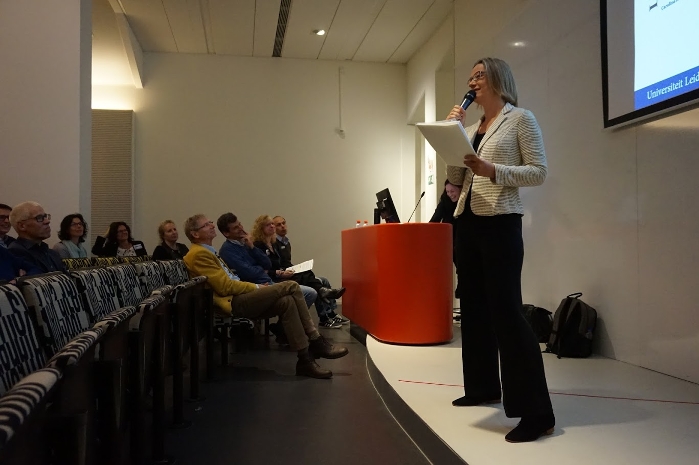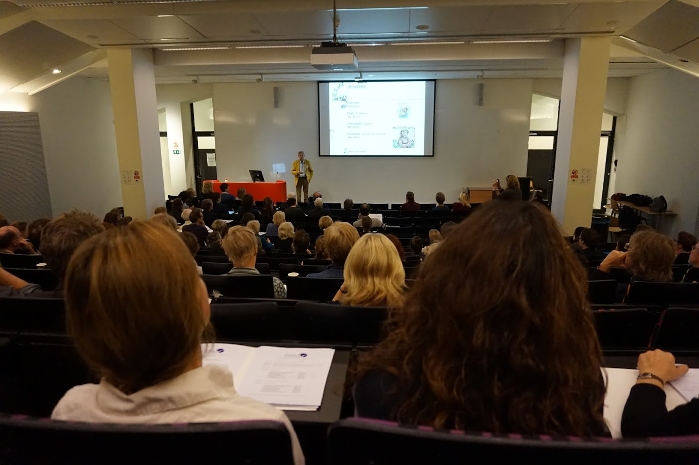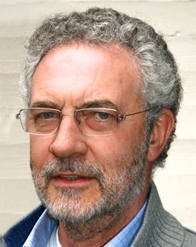
Leiden Teachers’ Academy conference focuses on academic skills
Everyone agrees that university students need to learn academic skills. But what exactly are we talking about? The Leiden Teachers’ Academy organised a conference on 7 November on this topic.
Three new Academy members
The conference was the first public event for the University's new Vice-Rector Hester Bijl. On the fifth day in her new role, Bijl, who comes from the TU Delft, told the 190 conference attendees that she senses an enormous energy in Leiden for bringing innovation to our teaching. Her predecessor Simone Buitendijk set a lot of actions in motion in the field of teaching and learning, including the Leiden Teachers’ Academy (LTA). Bijl intends to support these initiatives, where possible to further strengthen them and to connect them with one another and with the organisation. The LTA comprises a group of twenty enthusiastic teachers - nominated by the faculties - who are all involved in innovation in teaching and learning. Bijl installed three new members: Kim Beerden, historian and winner of the University's LUS Teaching Prize 2016, Nadira Saab (ICLON) and Joanne Mol (archaeology).

Is knowledge absolute?
Keynote speaker Henk Procee, emeritus Professor of Philosophy at the Technical University Twente, explained that academic training goes back to the ancient Greeks, such as Aristotle. Even then they knew that absorbing knowledge is different from evaluating that knowledge. It's all about the 'approach'. Does truth really exist? Is knowledge just a particular version of reality, and how do you judge that?
Von Humboldt
Procee moved from the ancient Greeks to German scientist Alexander von Humboldt (1769-1859) who coined the concept of Bildung. The term is virtually untranslatable, but it's close to what we now refer to as academic training. His contemporary John Henry Newman placed a strong emphasis on knowledge acquisition. And while Newman was in favour of a separation between research and teaching, Von Humbolt was against this. It is by doing research that students acquire academic skills. Leiden University strongly endorses Von Humboldt's view.
Student associations
The University has delivered knowledge for a long time, while the student associations were expected to take care of academic skills, such as giving presentations and debating. In the 1960s the University also took over the responsibility for these skills. Knowledge is and remains a conditio sine qua non for academic skills.

ICT and teaching
Helen Westgeest, lecturer in photography and film, and chairman of the 2nd LTA teaching conference, asked the public for their help in recording all the different clubs and organisations at Leiden University that are involved in innovation and teaching. There are quite a few but there's no one person who knows about all of them.
Workshops
After the plenary session the conference participants could choose two two of the fourteen workshops, all of which were on the subject of academic skills. The topics included academic writing, debating, collaborating, formulating research questions, academic integrity, presenting and critical self-reflection.
(CH)
Two of the conference attendees talk about the workshop they chose and why
Jops van der Steenhoven, retired GP, is a lecturer in the bachelor's programme in Medicine. He teaches students the anamnese (the interview between doctor and patient) and the physical examination that follows on from the anamnese, resulting in a possible diagnosis. At least...  Van der Steenhoven explained, ‘I don't actually teach them anything; they learn themselves and from one another. I'm both coach and teacher. It's important that a student responds to a patient in a civilized, friendly, open and empathetic way. That's an absolute pre-requisite for being able to arrive at a diagnosis. I also keep a good eye on my students. What mistakes do they make and why? Are they comfortable in their own skin? I also think learning is a matter of self-learning. I believe in life-long learning, and I like teaching, so I'm happy to continue to be involved in it.' The two workshops Van der Steenhoven chose were ‘Academic writing in the curriculum’ and ‘An academic attitude’.
Van der Steenhoven explained, ‘I don't actually teach them anything; they learn themselves and from one another. I'm both coach and teacher. It's important that a student responds to a patient in a civilized, friendly, open and empathetic way. That's an absolute pre-requisite for being able to arrive at a diagnosis. I also keep a good eye on my students. What mistakes do they make and why? Are they comfortable in their own skin? I also think learning is a matter of self-learning. I believe in life-long learning, and I like teaching, so I'm happy to continue to be involved in it.' The two workshops Van der Steenhoven chose were ‘Academic writing in the curriculum’ and ‘An academic attitude’.
Marion Boers, lecturer in art history wonders whether there are other ways of acquiring knowledge than the traditional methods. 'If you see that students are using all kinds of tools, their mobiles, iPads and laptops, you have to ask yourself why we aren't using those same tools. You hear a lot of complaints that students don't know anything any more, but maybe we should base our ideas more on their digital world. You can combine that with a critical attitude: what of the information you come across is reliable and what isn't? And rather than only papers and theses, couldn't we consider other types of academic performances? In our profession that could include arranging an exhibition, for example.'
Boers's first choice was the workshop on Collaboration. 'I really think this is an aspect of academic training that is under-estimated. Later in their professional careers students will have to learn to work together with other people, wherever they are. But the problem for us is of course how to assess a group assignment. Can you assess the group as a whole, or do you hve to look at the individual performance of each student?' This might explain her choice of 'Evaluating academic skills' as her second workshop.
